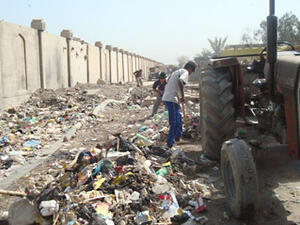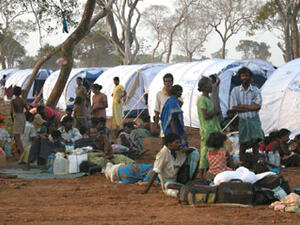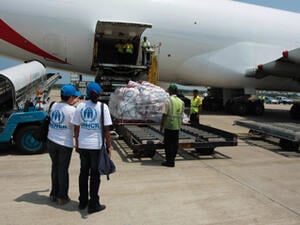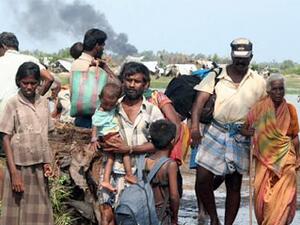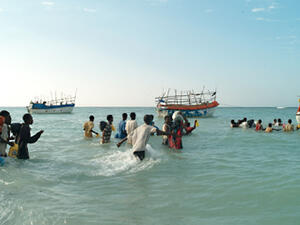Helping Afghan returnees put water under the bridge
Helping Afghan returnees put water under the bridge
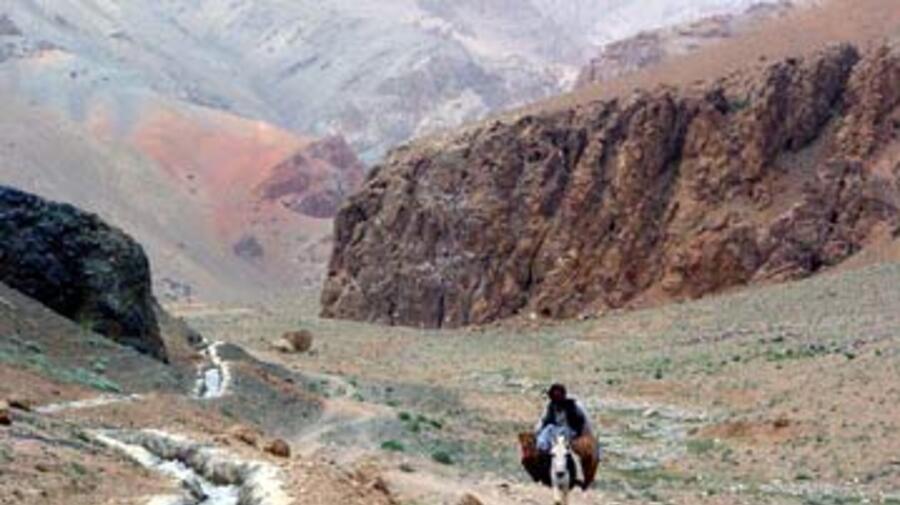
A canal built by returnees through UNHCR's income generation project in Bamiyan, central Afghanistan.
BAMIYAN, Afghanistan, August 11 (UNHCR) - Bamiyan, in central Afghanistan, is an exceptional place. It has the country's first and only female provincial governor. It's the site of international efforts to restore the majestic Buddhas carved into a cliffside that were destroyed by the Taliban. And it is home to the country's Hazara ethnic group.
In a country that overwhelmingly adheres to Sunni Islam, the Hazaras, with their distinctive Asiatic appearance, are predominantly Shiite Muslims. It was for this reason that the Taliban repeatedly attacked Bamiyan and other towns in the region, forcing many Hazaras to flee to Iran or Pakistan.
Today Bamiyan is considered one of the most secure provinces in Afghanistan. But with the return of nearly 4 million Afghan refugees to their homeland since 2002, in Bamiyan, as elsewhere in the country, disputes between communities are inevitable.
Cut off by the spectacular Koh-i-Baba mountain range, Bamiyan is the isolated capital of Afghanistan's central highlands. UN flights connect the city to Kabul in less than 30 minutes - a journey that would take many hours along the region's dirt roads.
In the village of Sar-i-Qul Topchi, near Bamiyan town, men representing Hazara, Tajik and Pashtun communities have gathered in the home of Haji Abdul Mohammed for one of their regular meetings. The 22 men are members of the local peace committee created as a result of a UNHCR co-existence project, implemented by the non-governmental organization, Save the Children Japan.
Each committee member has received training in conflict resolution and attended workshops where co-existence issues were discussed. The committee is designed to complement existing village authorities such as elders and local councils known as shuras. Once formed, families are encouraged to bring their disputes to the committee. The grievance is then investigated by a working group of five committee members before a decision is issued.
In Sar-i-Qul Topchi, as in other communities of mixed ethnicity, disputes are more often about access to land or water than religion. A second phase of the co-existence project ensures that the root cause of the dispute is addressed. In this case, water pipes and a small dam are being constructed to improve the volume of water provided by a mountain stream which serves the communities.
The construction work is a joint effort between the UN refugee agency, UN Habitat and the Afghan government's National Solidarity Programme.
"The three-month building project is aimed at providing people in these villages with irrigation water, short-term job opportunities, and, of course, promoting co-existence among the different communities," says Mustafa Hussaini of UNHCR in Bamiyan.
For Amir Dud, a peace committee member, the end result is straightforward. "Having access to water means ending disputes among the different tribes in this area," he says.
The work on the irrigation scheme is due to be completed in November, before the long and harsh winter sets in, when temperatures regularly plummet to minus 35 degrees Celsius.

Peace committee members inspect the site of an irrigation project in Bamiyan. All members are trained in conflict resolution before the construction stage of UNHCR's co-existence project starts.
For Haji Abdul Mohammed, the peace committee's chairman, the success of the co-existence project should reassure those Afghan refugees who are concerned about facing ethnic conflict on their return.
"Many people who are still living as refugees may have fears that they will face persecution or harassment once they return to their areas of origin," he says. "I hope that the creation of peace committees such as ours can serve as a symbol of national unity."
By Tim Irwin
UNHCR Kabul



